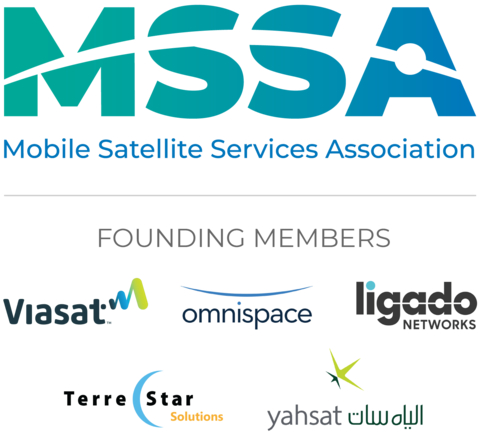New Mobile Satellite Industry Association to Advance Global Connectivity for Direct-to-Device and IoT Services
- None.
- None.
Insights
The formation of the Mobile Satellite Services Association (MSSA) by companies including Viasat, Terrestar Solutions, Ligado Networks, Omnispace and Yahsat represents a strategic consolidation of efforts in the satellite services industry. This collaboration aims to enhance global connectivity through the integration of terrestrial and non-terrestrial networks (NTNs), utilizing L- and S-band spectrum for direct-to-device (D2D) communication. The initiative is poised to address connectivity gaps and could significantly influence the telecommunications market by offering new avenues for mobile network operators (MNOs) and over-the-top (OTT) internet services.
The MSSA's alignment with 3GPP standards is a crucial step towards ensuring compatibility with existing mobile networks and facilitating seamless roaming between terrestrial and satellite systems. This compatibility could lead to widespread adoption and standardization, potentially disrupting the current market dynamics. The focus on narrowband Internet of Things (NB-IoT) services and 5G New Radio (5G-NR) advancements indicates a forward-looking approach that aligns with the industry's trajectory towards ubiquitous connectivity and enhanced mobile broadband services.
Furthermore, the association's advocacy for policies and regulations conducive to efficient and sustainable use of spectrum and orbits is vital for long-term industry growth. It also underscores the importance of addressing regulatory challenges that may arise from the increased integration of space-based networks into national telecommunications infrastructures.
The announcement of MSSA underscores a growing trend in the telecommunications sector towards hybrid space-terrestrial networks. By pooling spectrum resources and advocating for interoperable standards, MSSA members are likely to drive innovation and competition in the connectivity market. This could lead to a diversification of services and potentially lower costs for consumers due to economies of scale and improved network efficiencies.
From a market perspective, the association's efforts to enhance D2D connectivity will likely catalyze growth in various industry segments such as agriculture, automotive and government services, which rely on robust and ubiquitous communication networks. The ability to provide connectivity in remote and underserved areas could also open up new markets and revenue streams for the involved companies and the broader industry.
It is important to monitor how the MSSA's activities will impact the competitive landscape, particularly for traditional MNOs and satellite service providers. The emphasis on open, standards-based solutions and the potential for seamless global coverage may encourage further partnerships and consolidation in the sector, reshaping the industry's structure and competitive dynamics.
The MSSA's commitment to sustainable network design and operation is a critical consideration in the context of the expanding space economy. With the growing number of objects in orbit, sustainable use of space and spectrum resources is increasingly important to prevent overcrowding and interference issues. The association's focus on rational, efficient and safe uses of these resources reflects an industry awareness of the environmental and operational challenges posed by space debris and spectrum congestion.
By advocating for sustainable practices and policies, the MSSA may influence not only its member companies but also set a precedent for the industry at large. This could lead to the development of more responsible and environmentally friendly technologies and operations, which is essential for the long-term viability of space-based services. Additionally, the emphasis on open standards and architectures may promote inclusivity and equitable access to the benefits of the space economy, particularly for nations seeking to participate in these advanced services.
- The Mobile Satellite Services Association (MSSA) has a vision of integrating terrestrial and non-terrestrial network (NTN) services to deliver scalable, sustainable, and affordable connectivity to any device, anytime, anywhere
- Enables over 100 MHz of standards-based, interoperable L- and S-band spectrum for D2D across multiple MSS networks globally

Advancing the development of direct-to-device (D2D) and IoT connectivity through an ecosystem of Non-Terrestrial Network (NTN) providers. (Graphic: Business Wire)
MSSA seeks to develop a global ecosystem utilizing over 100 MHz of L- and S-band spectrum already allocated and licensed for mobile satellite services (MSS), which is well-suited for integration into a broad range of mobile devices. The non-profit industry association intends to align with 3rd Generation Partnership Project (3GPP) standards to extend terrestrial mobile coverage for both Mobile Network Operator (MNO) and Over-the-Top (OTT) internet services.
MSS licensed spectrum advantages include: enabling existing space networks to immediately offer Narrowband Internet of Things (NB-IoT) services, an existing international regulatory framework, no interference with terrestrial networks, and more spectrum to advance 5G New Radio (5G-NR) services. MSS spectrum enables all MNOs to offer space/terrestrial integration in their entire service area without having to sacrifice terrestrial spectrum.
By aligning their expertise, along with other ecosystem partners, the founding members support integrating terrestrial and non-terrestrial networks (NTNs) to deliver scalable, sustainable and affordable connectivity to any device, anytime, anywhere. Emerging D2D services can expand connectivity and enable competition across multiple large and diverse segments, including cellular, industrial, government, agriculture, automotive and others. The Association will foster a D2D ecosystem of solutions providers including terrestrial mobile and satellite operators, OEMs, infrastructure, chip vendors, and others.
“Integrating satellite connectivity into consumer mobile devices is a transformative opportunity for the satellite industry. As a coalition of leaders with a unified voice, MSSA will be a driving force in making this new marketplace a reality, while respecting the rights of nations to meaningfully engage and retain sovereignty in a rapidly growing space economy,” said Mark Dankberg, Chairman of MSSA, and Chairman and CEO of Viasat. “The Association will help create opportunities to scale NTN systems via open, standards-based solutions for D2D and IoT. We believe this can be done while preserving critical MSS aviation and maritime safety services and by expanding the markets supporting diverse users through substantial improvements in speed, bandwidth, availability, interoperability and affordability.”
MSSA is focused on achieving the following fundamental goals:
- Unlocking interoperable architectures and standards for use in multi-orbit satellite systems, ground infrastructure and end user equipment
- Enhancing seamless global roaming between terrestrial and multi-orbit satellite networks through the development of recommended specifications
- Achieving scale through improved coordination and cooperation mechanisms among MSS operators to maximize the utility of over 100 MHz of already available and licensed global MSS spectrum in nations desiring advanced NTN services
- Maximizing scarce multi-orbit space and spectrum resources and employing sustainable network design and operation to enable affordable advanced NTN services
- Advocating for policies, laws and regulations, including those related to rational, efficient, safe and sustainable uses of spectrum and orbits, and where appropriate, objective and quantitative metrics regarding all objects in orbit around Earth
- Providing a neutral forum for coordination of 3GPP NTN and other international standards activities
- Supporting the integration of space networks into national telecommunications infrastructure via trusted local partners and within sovereign regulatory and national security frameworks
- Supporting mechanisms for individual nations to participate in the new space economy via open standards and architectures, and via the space networks supported by MSSA
For more information on the formation and mission of MSSA, visit the Association’s website: www.mss-association.org.
To connect with an MSSA spokesperson at MWC 2024 (Press or Prospective members), please schedule a meeting via: PR@mss-association.org.
MSSA Founding Member Comments:
Jacques Leduc, President and CEO of Terrestar Solutions, highlighted, “Terrestar is proud to be a founding member of the Mobile Satellite Services Association, which promises to be a game-changer for all in remote areas by making mobile satellite service fill the connectivity gaps affecting close to one third of the Canadian population and many others around the world. As we leverage our existing satellite assets, and pool our efforts with world-class partners, direct-to-device services will soon ensure seamless global coverage and chart a path toward a digitally inclusive
“Ligado looks forward to working within the MSSA to bring our mobile satellite spectrum and network resources to bear in the North American market. D2D satellite services developed on the basis of the L- and S-band NTN ecosystem will deliver the highest performance, leveraging the superior assets and experience of MSSA member operators,” said Doug Smith, CEO of Ligado.
“In the past Omnispace has taken a leadership role in evolving terrestrial standards to enable non-terrestrial networks. Now with our industry partners we will be able to accelerate the development and optimization of spectrum and technologies designed to improve the lives of everyone on Earth,” said Ram Viswanathan, President and CEO, Omnispace. “We are pleased to join as a founding member of the MSSA, which can only further our industry’s ability to offer game-changing D2D global voice, text and data solutions to billions of users, devices and industries worldwide.”
“We are delighted to become the one and only satellite operator from the MENA region amongst MSSA’s founding members of leading satellite operators globally. The establishment of this new association is in line with our efforts to advocate the integration between satellite connectivity and terrestrial networks. This integration is crucial to harness the power of spacetech and accelerate the growth of emerging sectors, particularly Internet of Things (IoT) and Direct to Device (D2D). Both sectors are key pillars of Yahsat’s growth strategy,” said Ali Al Hashemi, Group CEO of Yahsat.
About MSSA
The Mobile Satellite Services Association (MSSA) advances the development of direct-to-device (D2D) and IoT connectivity through an ecosystem of Non-Terrestrial Network (NTN) providers that are committed to seamlessly extending mobile coverage globally. Founding members Viasat, Terrestar Solutions, Ligado Networks, Omnispace and Yahsat support a vision focused on facilitating the integration and evolution of terrestrial and satellite mobile networks to deliver scalable, sustainable and affordable high-performance cellular-like services to any device, anytime, anywhere in the world. To support this rapidly emerging market, the non-profit association will work to ensure MSS L- and S-band operators play a central role in facilitating the future of a robust and competitive D2D services market. Through the coordinated deployment of technical standards and enhancement of regulatory frameworks, the MSSA drives new initiatives to foster support for MSS-based services leveraging the 3GPP mobile standards. For more information, visit www.mss-association.org.
View source version on businesswire.com: https://www.businesswire.com/news/home/20240206302925/en/
MSSA PR Contacts:
Heather Chesterman or Mary Placido
Inventures for the Mobile Satellite Services Association (MSSA)
PR@mss-association.org
Source: Mobile Satellite Services Association
FAQ
What is the Mobile Satellite Services Association (MSSA) and who are the founding members?
What is the goal of MSSA?







